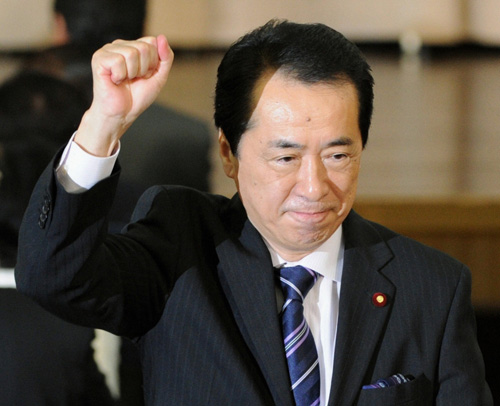Asia-Pacific
Naoto Kan elected as new Japanese PM
(Xinhua)
Updated: 2010-06-04 16:10
 |
Large Medium Small |
TOKYO - Former finance minister and deputy prime minister Naoto Kan was elected as Japan's new prime minister Friday following the majority of votes in elections held at the House of Representatives and more recently at the less powerful House of Councillors going his way in a leadership race that was largely uncontested.
Kan becomes Japan's 94th leader and the fifth prime minister since 2006.
Known as a grass-roots, straight talking politician, Kan, 63, takes over from Yukio Hatoyama who stepped down from the top spot Wednesday amid plunging support ratings over his inept leadership skills that finally led to the splitting of the ruling coalition.
Hatoyama's Cabinet also collectively resigned along with the outgoing prime minister on Wednesday.
Funding scandals and broken promises also plagued Hatoyama's eight month tenure.
The new prime minister has picked Yoshito Sengoku as Cabinet's chief secretary, a senior DPJ official said Friday.
Sengoku was previously state minister for national policy in Hatoyama's Cabinet.
|
||||
As well as ensuring his party's success in upper house elections scheduled in less than a month's time the new prime minister will turn his head to dealing with Japan's biggest public debt burden among industrialized countries - expected to balloon to 115 percent of gross domestic product over the next several years, as well as revive a sluggish economy and address an aging, shrinking population.
"My task is to rebuild this nation," Kan said after he was chosen as ruling party chief.
"I will carry on the torch of reviving Japan that the Democratic Party received from the people," he said.
"We will work together as one in the face of the tough political situation and the upcoming upper house election and fight together unified," he said after the party vote.
"Our first priority is to regain the trust of the people," he said, referring to the tainted image many Japanese people now have of the DPJ after funding scandals involving Hatoyama and Ozawa and a series of promises that the former prime minister backtracked on, including one to move an unpopular US marine facility out of Okinawa Prefecture.
Kan said he would honor an agreement to relocate the US Marine Corps. Futenma Air Base on Okinawa, and work to rebuild trust between the two allies.
He also said he would place equal emphasis on improving ties with China.
In Friday's party vote, Mr. Kan defeated Shinji Tarutoko, a relatively unknown legislator backed by the party's shadowy power broker, Ichiro Ozawa. Kan won with 291 votes to Tarutoko's 129.
Kan, known for being a short-tempered yet proactive politician, first came to prominence in the 1990s when as health minister in an era of closed-door politics and backroom dealings by the "old guard," he exposed a government cover-up of HIV-tainted blood products that caused thousands of hemophilia patients to contract the virus that causes AIDS.
Japan's new leader was first exposed to politics in his younger years as an activist involved in a number of civic movements.
He lost three elections before winning his first seat in the lower house in 1980 for the now-defunct United Social Democratic Party (USDP) with a "civil guerrilla" grass roots environmental campaign.
The DPJ will be counting on Kan to win back the trust of the public and analysts suggest the veteran politician's history of battling Japan's powerful bureaucrats, past civil rights activities and short fuse, will make for a more powerful, resolute and decisive leader, in comparison to his predecessor.




